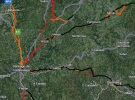- Time of past OR future Camino
- Podiensis, Portugues, Primitivo, 6 others
I'm sure many of you like me have followed the writing of Anton Pombo, who is currently lecturing in the United States. See this interview: https://www.fundacionjacobea.org/en...pombo-a-reflection-on-the-camino-de-santiago/
While so many of us truly believe there is no right or wrong camino, those of us who have walked the camino when it was less traveled also know that there have been profound changes in the camino infrastructure, all for the better, but also the profile of many walkers. In particular, there has been more and more voices concerned about "the last 100 kilometers" and the near obsession with receiving the compostella.
While there has been talk of increasing the required distance to 200 kms, I personally reject that because many working people in particular do not have the time for a longer walk. I suggest the 100 kms requirment be kept to receive a compostella. Instead, I suggest that just as more and more cities are issuing credentials, more and more cities should also present certificates to those who arrive there. Oviedo has a wonderful Salvadorana for those who walk the Salvador. We received that. We also received a certificate at the Shrine of the Virgen Peregrina in Sahagun after completing the Camino Madrid, which joins the Frances there. And then there is the certificate in Muxia.
Those who walk the Portugues know they will received a certificate at the tourist office in Padron. And when we walked the Ignaziano, we received a certificat in Manresa. I suggest that others cities follow suit, including Burgos and Leon, both of which have marvellous cathedrals that are shrines.
The definition of a pilgrimage is a walk to a shrine. Even Estella, which offers the oldest credencial, has a lovely shrine to the Virgen del Puy. They could also offer a certificate. And Pamplona can offer a certificate for those who walk the Baztan.
Let's be clear: while all roads may lead to Santiago, many who walk only have a week or so to walk. Santiago need not be the only goal.
While so many of us truly believe there is no right or wrong camino, those of us who have walked the camino when it was less traveled also know that there have been profound changes in the camino infrastructure, all for the better, but also the profile of many walkers. In particular, there has been more and more voices concerned about "the last 100 kilometers" and the near obsession with receiving the compostella.
While there has been talk of increasing the required distance to 200 kms, I personally reject that because many working people in particular do not have the time for a longer walk. I suggest the 100 kms requirment be kept to receive a compostella. Instead, I suggest that just as more and more cities are issuing credentials, more and more cities should also present certificates to those who arrive there. Oviedo has a wonderful Salvadorana for those who walk the Salvador. We received that. We also received a certificate at the Shrine of the Virgen Peregrina in Sahagun after completing the Camino Madrid, which joins the Frances there. And then there is the certificate in Muxia.
Those who walk the Portugues know they will received a certificate at the tourist office in Padron. And when we walked the Ignaziano, we received a certificat in Manresa. I suggest that others cities follow suit, including Burgos and Leon, both of which have marvellous cathedrals that are shrines.
The definition of a pilgrimage is a walk to a shrine. Even Estella, which offers the oldest credencial, has a lovely shrine to the Virgen del Puy. They could also offer a certificate. And Pamplona can offer a certificate for those who walk the Baztan.
Let's be clear: while all roads may lead to Santiago, many who walk only have a week or so to walk. Santiago need not be the only goal.





























